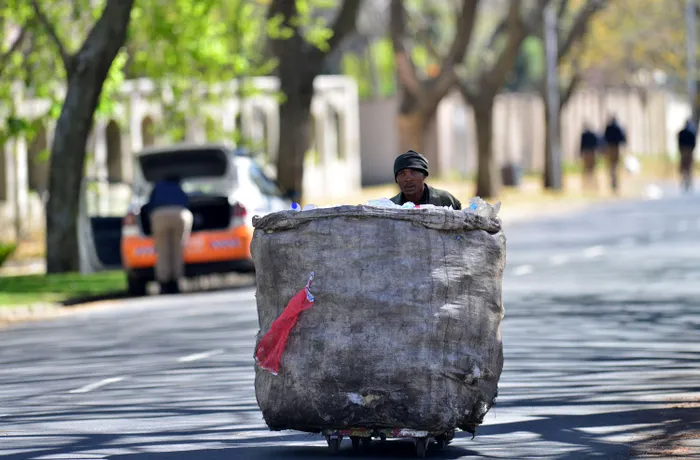
A man pushes recyclable goods, close to Former President Nelson Mandela's home.
Image: Photo: AFP
South Africa, like many of its BRICS+ counterparts, is at a crossroads. In 2025 alone, an estimated 3.67 million tons of domestic waste in South Africa were uncollected, according to recent parliamentary briefings, contributing to environmental degradation, illegal dumping, and threats to public health. But it doesn’t have to be this way.
According to Infrastructure News, waste-to-energy innovation offers South Africa a pathway out of landfill dependency; however, political will and infrastructure investment remain sluggish. Informal waste pickers, who process over 80% of the country’s recyclables, continue to operate without adequate support or formal recognition. This disconnect is not unique to South Africa, it reflects broader structural challenges shared across the BRICS+ bloc.
South Africa’s crisis has unique layers, from highly centralised systems that limit local government innovation to major gaps in public awareness around waste separation. It is fairly understood that municipal failures continue to undermine citizens’ constitutional right to a clean and healthy environment, made worse by failing service delivery. While the country has progressive environmental legislation on paper, implementation remains fragmented and uneven. Cape Town, for example, has made strides with organic waste processing and material recovery facilities in a few specific areas, but other cities still rely almost entirely on landfilling.
Lessons and Leaps from BRICS+ Partners
BRICS+ nations are adopting circular economies. India uses decentralised waste management with community segregation and integrated informal recycling. Brazil's solid waste policy promotes reverse logistics and EPR (Extended Producer Responsibility), especially in urban centres like São Paulo where cooperatives of waste pickers are transforming waste into livelihoods.
China leads in technological innovation, AI-driven sorting systems, smart bins, and massive investments in waste-to-energy plants have positioned it as a model for green urban planning. Even countries newer to BRICS+, such as Indonesia and the UAE, are investing in advanced material recovery facilities and public education campaigns aimed at reducing waste generation at the source. Iran and Egypt have both highlighted waste infrastructure development in their climate resilience strategies to counter their challenges with the high demands of waste management.
While South Africa can draw on these successes, what’s clear is that importing global best practice must be done in a way that aligns with local challenges. Unlike India’s bottom-up approach or Brazil’s vibrant cooperative networks, South Africa’s centralised system often fails to empower local actors. If South Africa hopes to emulate the BRICS+ leaders, it must localise solutions and actively include grassroots innovators and informal recyclers in decision-making.
South Africa has policy tools like the Climate Change Act, the Extended Producer Responsibility Regulations, and the National Waste Management Strategy, but suffers from chronic under-implementation. These policies aim to divert up to 70% of waste from landfills by 2035, but with poor municipal service delivery, the goal remains far off for a variety of reasons such as inconsistent waste collection, rising public health risks and the chronic underfunding and mismanagement of funds in the differing municipalities.
Waste as Opportunity: A Circular Economy for the Global South
In BRICS+ nations, the informal sector is crucial for waste recovery, but lacks formalisation. Integrated systems, such as Brazil’s cooperatives or India’s Swachh Bharat (a government initiative for sanitation and waste management inspired by Mahatma Gandhi), are vital. A circular economy is crucial for emerging economies. BRICS+ countries can lead in green innovation and infrastructure, with investments in composting, biogas, enzymatic recycling, and AI-powered logistics creating green jobs and reducing landfill pressure. The South African Green Fund (R800 million) is a start, but larger, coordinated initiatives are needed.
The recent BRICS+ environmental cooperation summit hinted at a more integrated approach, including knowledge-sharing platforms, climate financing for waste innovation, and joint research initiatives. If actualised, this could allow countries like Uzbekistan or Uganda to leapfrog toward sustainability using lessons from larger partners.
Path Forward: Collective Action for a Cleaner Future
The road to a resilient waste system for BRICS+ lies in cooperation, innovation, and grassroots participation. But first, South Africa must address gaps in enforcement, build institutional capacity, and empower municipalities to develop localised, people-centered solutions. Lessons from India and Brazil are valuable, but real change starts at home—with better funding, better governance, and stronger engagement with civil society and the informal sector.
There is no single solution to the BRICS+ waste crisis, but there is shared urgency. Coordinated public-private partnerships, regional investment in waste infrastructure, and the formalisation of informal recyclers must become priorities. The transition to a circular economy is about environmental survival, economic justice, dignity, and opportunity in the Global South.
The crisis is real, but so is the potential. Let’s not waste it.
Written by:
*Dr Iqbal Survé
Past chairman of the BRICS Business Council and co-chairman of the BRICS Media Forum and the BRNN
*Banthati Sekwala
Associate at BRICS+ Consulting Group
Egyptian & South African Specialist
**The Views expressed do not necessarily reflect the views of Fast Company
** MORE ARTICLES ON OUR WEBSITE https://bricscg.com/
** Follow @brics_daily on X/Twitter & @brics_daily on Instagram for daily BRICS+ updates
